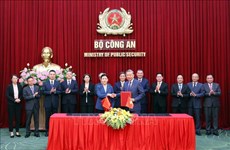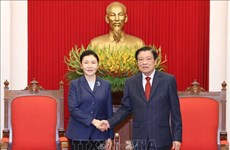ASEAN women plan to expand economic power
Enhancing women’s economic power is one of the important measures needed
to narrow the gap in gender equality and contribute to sustainable
economic development in each country and in the world.
Enhancing women’s economic power is one of the important measures needed
to narrow the gap in gender equality and contribute to sustainable
economic development in each country and in the world.
Participants of the 14th ASEAN Confederation of Women’s Organisations (ACWO) General Assembly made this affirmation at the first plenary session in Hanoi on Oct. 19.
More than 200 delegates from 10 ASEAN member countries and three dialogue partners -- China , Japan and the Republic of Korea -- and representatives from foreign embassies and international oganizations in Hanoi attended the two-day conference.
Laura Hang, President of the Singaporean Council of Women’s Organizations, said that despite the progress obtained in gender equality over the past century, women’s position in the society is still much lower than men.
Citing the result of a survey by the US magazine Fortune, Hang said that in the economic sector, only three percent of 500 companies surveyed had female CEOs and 15 percent of the board of directors were female. In the ASEAN region, the rate of women participating in the work force is lower than men and women get only 70-80 percent of salary at the same positions as men.
Hang said that governments and enterprises should have policies to facilitate women to take part in economic and social areas. Active factors helping improve women’s economic power include creating opportunities for women to receive better training, friendly working environments, enhanced leadership opportunities and participation in politics.
Sharing the same views, Meng Xiaosi, Vice President of the the All-China Women’s Federation, said that enhancing women’s economic power will enhance their position not only in the family, but also in society. To achieve this goal, they will need to be constantly trained.
To help strengthen women’s economic power, especially after the global economic crisis, Nguyen Thi Kim Thuy, Permanent Vice President of the Vietnam’s Women’s Union (VWU), recommended ASEAN governments continue improve mechanisms and policies to ensure the effective participation of women in the making of recovery and post crisis development policies.
In addition, Thuy said countries should strongly invest in poverty reduction and job generation, not only in the fields where men dominate, such as infrastructure and construction, but also in areas attracting may female workers like services and trade.
They also said the Vietnamese Government approved the project on supporting job training and generation for women in 2010-2015 in order to improve the effectiveness and competitiveness of female labour and raise status.
Those recommendations will be collected and put into the ACWO General Assembly Resolution to be approved on Oct. 20.
The resolution will show the general assembly’s viewpoint, commitment and plan of actions to enhance women’s involvement and contributions to each country’s development and promote the government’s pledge to advancement of women and gender equality.
Addressing the opening ceremony, Prime Minister Nguyen Tan Dung affirmed that women’s participation and contributions to ASEAN foundation and development was very important and decisive.
He expressed his belief that the ACWO General Assembly would generate many ideas and initiatives to develop the potential of women to contribute more to the goal to building an ASEAN Community and particularly the ASEAN Cultural and Social Community, as well as constantly raising the quality and effectiveness of ASEAN cooperation.
PM Dung said that in Vietnam , women had a very important role and contributed much to the national construction and defence. Over the past decades, the Vietnamese Party and State always attached importance to women’s role and ensured equality and the rights to develop, as well as created favourable conditions for women to contribute best to the country.
Vietnamese women have contributed much to the national renewal and held many important positions in the country, including in ministries, sectors and localities.
At the conference, the VWU, as ACWO President for 2008-2010 period, will transfer the presidency of ACWO to the National Council of Women’s Organisation of Indonesia for the 2010-2012 term.
The VWU said it believed ACWO’s activities and programmes would contribute to enhancing the friendship and cooperation among regional countries and turn the goals of ASEAN Charter into reality while successfully building the ASEAN community by 2015./.
Participants of the 14th ASEAN Confederation of Women’s Organisations (ACWO) General Assembly made this affirmation at the first plenary session in Hanoi on Oct. 19.
More than 200 delegates from 10 ASEAN member countries and three dialogue partners -- China , Japan and the Republic of Korea -- and representatives from foreign embassies and international oganizations in Hanoi attended the two-day conference.
Laura Hang, President of the Singaporean Council of Women’s Organizations, said that despite the progress obtained in gender equality over the past century, women’s position in the society is still much lower than men.
Citing the result of a survey by the US magazine Fortune, Hang said that in the economic sector, only three percent of 500 companies surveyed had female CEOs and 15 percent of the board of directors were female. In the ASEAN region, the rate of women participating in the work force is lower than men and women get only 70-80 percent of salary at the same positions as men.
Hang said that governments and enterprises should have policies to facilitate women to take part in economic and social areas. Active factors helping improve women’s economic power include creating opportunities for women to receive better training, friendly working environments, enhanced leadership opportunities and participation in politics.
Sharing the same views, Meng Xiaosi, Vice President of the the All-China Women’s Federation, said that enhancing women’s economic power will enhance their position not only in the family, but also in society. To achieve this goal, they will need to be constantly trained.
To help strengthen women’s economic power, especially after the global economic crisis, Nguyen Thi Kim Thuy, Permanent Vice President of the Vietnam’s Women’s Union (VWU), recommended ASEAN governments continue improve mechanisms and policies to ensure the effective participation of women in the making of recovery and post crisis development policies.
In addition, Thuy said countries should strongly invest in poverty reduction and job generation, not only in the fields where men dominate, such as infrastructure and construction, but also in areas attracting may female workers like services and trade.
They also said the Vietnamese Government approved the project on supporting job training and generation for women in 2010-2015 in order to improve the effectiveness and competitiveness of female labour and raise status.
Those recommendations will be collected and put into the ACWO General Assembly Resolution to be approved on Oct. 20.
The resolution will show the general assembly’s viewpoint, commitment and plan of actions to enhance women’s involvement and contributions to each country’s development and promote the government’s pledge to advancement of women and gender equality.
Addressing the opening ceremony, Prime Minister Nguyen Tan Dung affirmed that women’s participation and contributions to ASEAN foundation and development was very important and decisive.
He expressed his belief that the ACWO General Assembly would generate many ideas and initiatives to develop the potential of women to contribute more to the goal to building an ASEAN Community and particularly the ASEAN Cultural and Social Community, as well as constantly raising the quality and effectiveness of ASEAN cooperation.
PM Dung said that in Vietnam , women had a very important role and contributed much to the national construction and defence. Over the past decades, the Vietnamese Party and State always attached importance to women’s role and ensured equality and the rights to develop, as well as created favourable conditions for women to contribute best to the country.
Vietnamese women have contributed much to the national renewal and held many important positions in the country, including in ministries, sectors and localities.
At the conference, the VWU, as ACWO President for 2008-2010 period, will transfer the presidency of ACWO to the National Council of Women’s Organisation of Indonesia for the 2010-2012 term.
The VWU said it believed ACWO’s activities and programmes would contribute to enhancing the friendship and cooperation among regional countries and turn the goals of ASEAN Charter into reality while successfully building the ASEAN community by 2015./.













